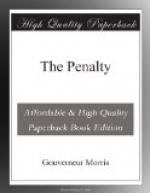To society the tragedy of Barbara’s back-sliding into art was very real. Dozens of men said very frankly that they missed her like the very devil. “There is nobody else,” they said, “quite so straightforward, or quite so good-looking.”
Hers was a face not less vivid than a light. It seemed that in her, the greatest artist of all, abandoning the accepted conventions of beauty, had created an original masterpiece. If she had been too thin, her eyes, tranquil, sea-blue, and shining, must have been too large. Her nose was Phidian Greek; her chin, but for an added youthful tenderness, was almost a replica of Madame Duse’s; a long round throat carried nobly a gallant round head, upon which the hair was of three distinct colors. The brown in the Master’s workshop had not, it seemed, held out; she had been finished with tones of amber and deep red. The brown was straight, the red waved, the amber rioted in curls and tendrils. Below this exquisite massing of line and color, against a low broad forehead, were set, crookedly, short narrow eyebrows of an intense black; her eyelashes were of the same divine inkiness, very warm and long; a mouth level to the world, resolute, at the corners a little smiling, was scarlet against a smooth field of golden-brown.
If she had a certain admiration of her own beauty it was the admiration of an artist for the beauty of a stranger. Since she had had neither hand nor say in her own making, the results were neither to her credit nor against it. For success in her chosen line she would have exchanged her beauty very willingly for a plain mask, her glorious youth for a sedate middle age. She would have given perhaps an eye, an ear, or so at least she thought in this ardent and generous period of early beginnings and insatiable ambition. In her thoughts nothing seemed to matter to her but art.
There was no sustaining pleasure in the fact that her father had given in to her. Opposition—unspoken, it is true, but not to be mistaken—remained in his attitude toward her. He found indirect means for conveying his idea and that of her friends that she was wasting herself upon a folly, and was destined, if she persisted in it, to only the most mediocre success. An exhibition of her works, undertaken with the avowed wish to know “just where she stood,” had been discouraging in its results. The art critics either refused to take her seriously or expressed the opinion that there were already in the world too many sculptors of distinguished technique and no imagination whatsoever. Her friends told her that she was a “wonder.” And there were little incidents of the farce which caused her to bite her lips in humiliation.
That the critics should be at the pains of telling her that she was without imagination angered her, since it was a fact already better known to herself. And in one moment she would determine at all costs to prove herself an imaginative artist, and in the next “to chuck the whole business.” But she could not make up her mind whether it is worse for a captain to wait for actual defeat or, having perceived its inevitability, to surrender. To go down with colors flying appeals perhaps to noble sides of man; but it is a waste of ships, lives, and treasure.




